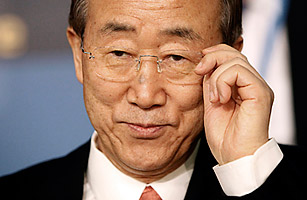
United Nations Secretary General, Ban Ki-moon arrives for the opening of the three-day World Summit on food security in Rome, Italy.
As the Secretary-General of the United Nations, Ban Ki-Moon has a wealth of global problems he could turn his focus on: genocide, war, HIV. But the South Korean diplomat has chosen to make climate change his number one priority, even hosting a one-day, high-level summit on warming at the UN in New York this September. Now with a momentous climate change summit under way in Copenhagen, Ban's efforts are bearing fruit. He spoke with TIME's Bryan Walsh about his hopes for the conference, the responsibilities of rich and poor nations and why climate change is ultimately a moral issue.
What needs to happen at the Copenhagen climate summit for it to be considered a success?
Developed countries should come up with ambitious midterm targets of greenhouse gas reductions of 25 to 40%, as recommended by the Intergovernmental Panel on Climate Change (IPCC). Many countries have come out with cuts. Japan has come out with 25% and Norway with 40%. South Korea has committed to a 30% cut. And developing countries like Brazil, South Africa, Indonesia and even India and China are coming out with commitments.
That 25% to 40% cut you're calling for comes from the IPCC. But the emission cuts pledged by the U.S. are far short of that level. Does the U.S. need to do more, given that it is the world's biggest historical carbon emitter?
I would hope the U.S. would come out with more ambitious targets. I know that the domestic political situation is not that easy. But as the momentum continues, I hope the U.S. will come out with more ambitious cuts. We count on the leadership of the U.S.
You mention nationally appropriate mechanisms for developing countries. Now China and India have come out with pledges to cut emissions, but do those actions have to be measurable and verifiable internationally, to put them on the same level as developed nations?
What I understand from their statement is that they are domestically bound [to cut emissions]. That is very important. I hope they will be implanted in a verifiable, measurable and reportable way.
What role do you envision the UN playing as we decide what body or group of bodies will actually be responsible for administering climate adaption funds?
The UN has led the climate negotiations and the UN has the widest and richest experience in development and climate change mitigation. We have representatives throughout the world in the United Nations Development Programme and the United Nations Environment Programme, and therefore will always have a central role to play in terms of leading the negotiations and implementing them.
You've made climate change a signature issue during your time as Secretary-General. Why?
Climate change is by far the most important and fundamental issue affecting all of our lives. It affects core development issues: poverty, water scarcity, disease, regional and political instability, global health. All of these issues are interconnected. [If we take on climate change], we can be in a much better position to address and resolve all of these issues. Climate change affects the future of humanity, and it affects the future of the planet Earth. If we lose our planet, then what's the use of addressing other development issues?
Does any climate adaptation aid need to come on top of existing development aid, since other development problems presumably won't go away just because we're dealing with climate change?
Yes, and that's why soon after the Copenhagen meeting I'm going to announce the official launch of a high level panel on climate change and development. We are just now addressing the issue in a comprehensive manner. This high level panel will be composed of some incumbent heads of state, along with experts, senior government officials and community leaders, all in time for Rio +20. [That would be 20 years after the Earth Summit in Rio in 1992.]
Ultimately only a handful of major countries — like the U.S., India and Brazil — are responsible for the vast majority of carbon emissions. Why should climate change be dealt with through the entire UN, rather than just focusing on the major emitters?
We all share one common carbon space. So wherever there is carbon dioxide emitted it affects all countries around the world, without regard to size. That's why we have to address this issue collectively. The U.S. is such a massive economic power, and they can claim that they can address these issues, but their carbon dioxide will affect all other parts of the world. Unfortunately, the most vulnerable developing countries that have contributed least to the current phenomenon will be the first and the worst to be hit. That is why I have been arguing that developed countries must pay for these people. They have the political and the moral responsibility to do so.
What do you say now to the people who still don't believe in climate change, or say we can't afford the cost of taking it on?
I know there are some skeptics still. I'm not a scientist and I don't pretend to be a scientist. But I believe the best scientific evidence and information has given us a very clear message. And that message is that climate change is happening and it is happening much faster than we realize.